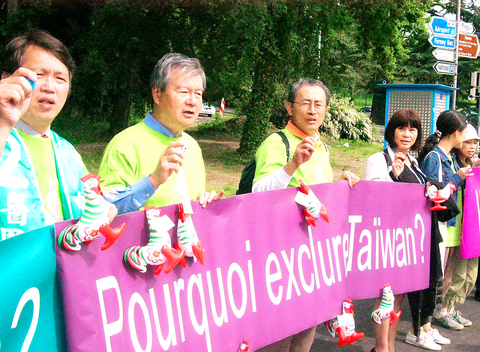Taiwan's 10th bid to obtain observer status at the World Health Assembly (WHA) failed yesterday as the assembly excluded the addition of Taiwan's observer application from its agenda.
After one hour of discussion, the WHA's General Committee yesterday ruled out the inclusion of Taiwan's bid as a supplementary item on the assembly's agenda.
The WHA, which opened yesterday, is the highest-decision making body of the WHO.

PHOTO: WANG PING-YU, TAIPEI TIMES
During the discussion in the General Committee, Taiwan's diplomatic allies Gambia and Belize proposed to add Taiwan's bid to the assembly's agenda, but the bid was challenged by Cuba and China.
During the second plenary session of the General Committee, two of Taiwan's allies, Malawi and Palau, defended Taiwan against Pakistan and China, who spoke against the bid.
The Chinese delegates attending the assembly were Health Minister Gao Qiang (
Confronted by Taiwanese journalists at the entrance of the assembly hall prior to the opening ceremony of the assembly, Gao refused to make any comment, but told Taiwanese journalists to attend a press conference he would convene late yesterday evening.
Sha, however, told reporters that under the "one China" principle, "we support Taiwanese participation in the WHO's technical activities to the maximum level," adding that "what constitutes maximum participation is something that can be negotiated."
"We have been very concerned about the [Taiwanese people's] health. This is absolutely for sure," he said.
In response to questions from reporters about the Taiwan's refusal to participate in the WHO under the "one China" principle, Sha said "it [the principle] is a consensus in the international community."
Groups of Taiwanese who had traveled from the US, Europe and Taiwan yesterday gathered outside the UN building where the WHA was meeting to appeal for support for Taiwan's bid. Chanting slogans and singing songs, the demonstrators urged the WHO to allow Taiwan's participation.
"The more China opposes us, the more confident we'll remain to strive for WHO participation," said Wu Shu-min (吳樹民), president of the Medical Professionals Alliance of Taiwan.
In related news, New Zealand's parliament recently passed a resolution to show its support for Taiwan's bid to participate in the WHO and its activities, Taiwan's representative in New Zealand said yesterday.
The Foreign Affairs, Defense and Trade Committee of the parliament passed the resolution last Friday. The resolution requests that the government support Taiwan's bid to join the WHA as an observer, Representatve Victor Chin (
The parliament passed the resolution based on an appeal made to the parliament last month by some 1,000 Taiwanese expatriates and New Zealand citizens, Chin said.

AGING: As of last month, people aged 65 or older accounted for 20.06 percent of the total population and the number of couples who got married fell by 18,685 from 2024 Taiwan has surpassed South Korea as the country least willing to have children, with an annual crude birthrate of 4.62 per 1,000 people, Ministry of the Interior data showed yesterday. The nation was previously ranked the second-lowest country in terms of total fertility rate, or the average number of children a woman has in her lifetime. However, South Korea’s fertility rate began to recover from 2023, with total fertility rate rising from 0.72 and estimated to reach 0.82 to 0.85 by last year, and the crude birthrate projected at 6.7 per 1,000 people. Japan’s crude birthrate was projected to fall below six,

US President Donald Trump in an interview with the New York Times published on Thursday said that “it’s up to” Chinese President Xi Jinping (習近平) what China does on Taiwan, but that he would be “very unhappy” with a change in the “status quo.” “He [Xi] considers it to be a part of China, and that’s up to him what he’s going to be doing, but I’ve expressed to him that I would be very unhappy if he did that, and I don’t think he’ll do that. I hope he doesn’t do that,” Trump said. Trump made the comments in the context

SELF-DEFENSE: Tokyo has accelerated its spending goal and its defense minister said the nation needs to discuss whether it should develop nuclear-powered submarines China is ramping up objections to what it sees as Japan’s desire to acquire nuclear weapons, despite Tokyo’s longstanding renunciation of such arms, deepening another fissure in the two neighbors’ increasingly tense ties. In what appears to be a concerted effort, China’s foreign and defense ministries issued statements on Thursday condemning alleged remilitarism efforts by Tokyo. The remarks came as two of the country’s top think tanks jointly issued a 29-page report framing actions by “right-wing forces” in Japan as posing a “serious threat” to world peace. While that report did not define “right-wing forces,” the Chinese Ministry of Foreign Affairs was

PREPAREDNESS: Given the difficulty of importing ammunition during wartime, the Ministry of National Defense said it would prioritize ‘coproduction’ partnerships A newly formed unit of the Marine Corps tasked with land-based security operations has recently replaced its aging, domestically produced rifles with more advanced, US-made M4A1 rifles, a source said yesterday. The unnamed source familiar with the matter said the First Security Battalion of the Marine Corps’ Air Defense and Base Guard Group has replaced its older T65K2 rifles, which have been in service since the late 1980s, with the newly received M4A1s. The source did not say exactly when the upgrade took place or how many M4A1s were issued to the battalion. The confirmation came after Chinese-language media reported